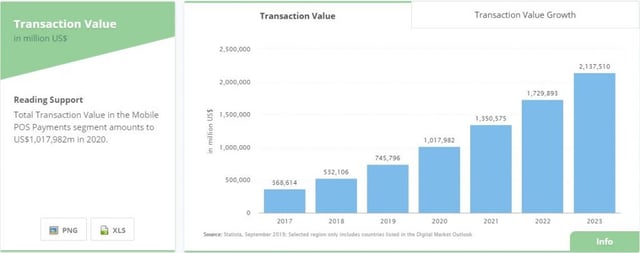Online shopping is amazing! It’s fast, convenient, and you immediately have all the information from the transaction as soon as you’re done. That makes us ask the question, “If retail stores and restaurants can do this, why not hospitals?” The answer comes down to the hardware and software that the latter two have, but hospitals lack POS and mPOS Systems.
What is Point of Sale?
You’re probably familiar with traditional POS Systems seen in most retail stores. They’re those clunky desktop computers that allow you to accept card payments through a card reader (either integrated into the monitor or a separate device connected to the network). Mobile POS (mPOS) Systems, on the other hand, refer to smaller devices (usually phones and tablets) that take that same functionality on the go. This dynamic flexibility allows you to make transactions anytime, anywhere. However, you may lack some of the same features that regular POS Systems can offer so you’ll have to do some research to figure out which one is best for your hospital.
So why is this important for hospitals?
Online menu for patients
A Mobile POS can be used for more than just processing payments on the spot. Sometimes, it’s nice to set your hospital apart by offering small conveniences, like an online menu available via a tablet. Not only does this make tracking and storing your transactions simple, but you can save trees by offering a completely digital menu, that you can change/update any time you want. A Mobile POS tablet can be included in every room or given to individual staff members.
Record-Keeping
One of the most valuable assets of POS and Mobile POS Systems is the ability to keep records of daily transactions accurately. Since mPOS Systems are cloud-based, you and your patients can rest easy knowing this data is secure.
Real-Time Inventory Tracking
Speaking of accurate record-keeping, you can also use these devices to manage your inventory in real-time (no delay in updating). We all know that a hospital has an unfathomable number of instruments, supplies, and cleaning solutions that make the whole operation function. That’s why it’s critical to know where you stand when it comes to your inventory.
Auto Ordering
Real-time inventory tracking also allows you to automate a lot of the processes that used to fill your day with stress and tears. For example, you can set up a notification whenever your inventory drops to a certain number of plastic gloves. Instead of panicking, when an employee tells you there’s no more, you can sleep sound knowing that a shipment is coming before you ever run out. Of course, this applies to more essential items a hospital might need as well.
Make Your Hospital More Efficient
The beauty of real-time data and having all that information at your fingertips is the ability to see gaps and identify ways to eliminate wasteful spending; this is probably the most useful feature, and it’s critical for hospitals that can’t find the holes when it comes to profit loss. You might find that a specific brand is too costly or that your employees weren’t accurately recording transactions. Whatever the case, you can use this feature to gain a better understanding of your spending.
Takeaways
Hospitals are slowly starting to implement POS systems and not just for making payments on medical bills. According to Statista, the use of Mobile POS Systems is rising year over year with the same level of regularity (see graph below).

There are multiple ways mPOS Systems can make your hospital more flexible and save money at the same time. People prefer simplicity and speed. If you want to keep up, you need a way to offer your patients the same level of convenience you’d find at a retail store or restaurant. If you’re interested in implementing a traditional POS or mPOS System for your hospital, contact us to learn more about our healthcare solutions.